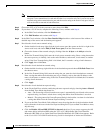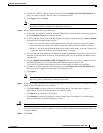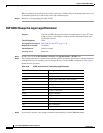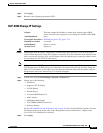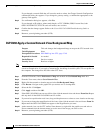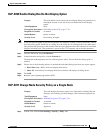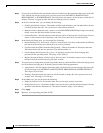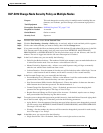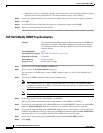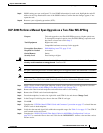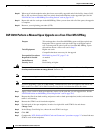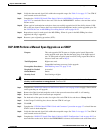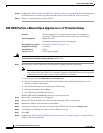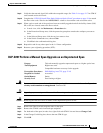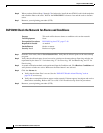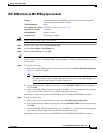
19-78
Cisco ONS 15454 SDH Procedure Guide, R7.2
October 2007
Chapter 19 DLPs D200 to D299
DLP- D273 Modify SNMP Trap Destination
• Disable Inactive User—If checked, disables users who do not log into the node for the period of time
specified in the Inactive Duration box. The Inactive Duration range is 45 to 90 days.
Step 9 In the Select Applicable Nodes area, uncheck any nodes where you do not want to apply the changes.
Step 10 Click OK.
Step 11 In the Security Policy Change Results dialog box, confirm the changes and click OK.
Step 12 Return to your originating procedure (NTP).
DLP-D273 Modify SNMP Trap Destination
Step 1 In node view, click the Provisioning > SNMP tabs.
Step 2 Select a trap in the Trap Destinations dialog box.
For a description of SNMP traps, see the “SNMP” chapter in the Cisco ONS 15454 SDH Reference
Manual.
Step 3 Type the new SNMP community name in the Community field.
Note The community name is a form of authentication and access control. The community name
assigned to the ONS 15454 SDH is case-sensitive and must match the community name of the
network management system.
Note The default UDP port for SNMP is 162.
Step 4 Set the Trap Version field for either SNMPv1 or SNMPv2.
Refer to your NMS documentation to determine whether to use SNMPv1 or SNMPv2.
Step 5 If you want to allow the ONS 15454 SDH SNMP agent to accept SNMP SET requests on certain MIBs,
check the Allow SNMP Sets check box. If the box is not checked, SET requests are rejected.
Step 6 If you want to allow the ONS 15454 SDH SNMP agent to serve as a proxy (that is, it relays the traps to
an ONS 15454 SDH that is directly connected to an SNMP destination), check the Allow SNMP Proxy
check box. If the box is not checked, the ONS 15454 SDH will not relay the traps.
Step 7 If you want to allow using generic SNMP MIBs, check the Use Generic MIB check box.
Step 8 Click Apply.
Purpose This task modifies the Simple Network Management Protocol (SNMP) trap
destination on an ONS 15454 SDH including community name, default
User Datagram Protocol (UDP) port, SNMP trap version, and maximum
traps per second.
Tools/Equipment None
Prerequisite Procedures DLP-D60 Log into CTC, page 17-49
Required/As Needed As needed
Onsite/Remote Onsite or remote
Security Level Provisioning or higher



